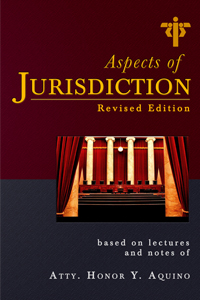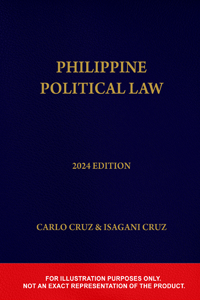- Aspects of Jurisdiction
- Dean Honorato Aquino
- Publisher: Central Book Supply, Inc.
- ISBN: 978-971-011-573-0
- No. of Pages: 334
- Size: 6 x 9
- Edition: 2013
Description:
When the man in the street finds himself on the business end of a lawsuit, he runs to his lawyer for help. He leaves his fate pretty much in the hands of the lawyer in the belief that the latter is better prepared to deal with his tormentor. By and large, that is not an unreasonable assumption. His tormentor is a lawyer, so he gets himself what looks to be a more expensive and sharper lawyer.
Having pocketed the customary “acceptance fee,” the lawyer makes a show of reading the complaint. He knits his brows, purses his lips, and makes the appropriate deprecating noises for the benefit of his client. As he surfs from averment to averment, he runs dozens of half-remembered legal principles in his mind, hoping to hit on a theory that will deal that clean shot to the solar plexus that will bring his opponent to his knees. More often than not, there is more gut feel than system. Having read through the complaint, the lawyer tells his client, conspiratorially, to see him in a week’s time.
When the client shows up again, the lawyer brandishes a draft response menacingly. The draft, whether a motion to dismiss or an answer, is really not much more than a string of homogenized denials calculated more to impress the client and soften him up for collection purposes than to score a swift legal victory. But of course the client is properly impressed, and is now willing to sign a fee agreement or, better, make a substantial advance payment.
Going by the case reports though, there are many cases reaching the Supreme Court which should have been won right from the start if only the lawyer had paid more attention to the matter of jurisdiction. In the landmark case of Tijam v. Sibonghanoy, 23 SCRA 29 (1968), for instance, it was only on appeal that a motion to dismiss on the ground of lack of jurisdiction of the trial court was raised for the first time, fifteen long years after the case was filed. The High Court ruled that the motion to dismiss, regardless of intrinsic merit, was already barred by laches. In other words, some people, including the trial judge, were half-asleep during the early stages of the case.
How much easier and more professional it would be if the lawyer had a kit with which to take the complaint apart, as it were. That is the whole idea behind this work. It brings together in a slim volume a number of statutes and doctrines that should come in handy in processing a complaint or other initiatory pleading. Counsel for the defendant would do well to have these laws at his fingertips if he is to do justice to a complaint which a worthy brother in the profession had spent a sleepless night to prepare.
Even the counsel for the plaintiff can profit from a compilation such as this. He can use it as a device to make his initiatory pleading more or less dismissal-proof. Nothing is more embarrassing for a lawyer, especially one who has pocketed a substantial “acceptance” fee, than to have his complaint dismissed without trial because he filed it with the wrong court.
If this work succeeds in making the drudgery of drawing up a pleading just a little bit less of a drudgery, I shall be content. If it wins the case for you my dear reader, I shall be gratified beyond words. -HYA






